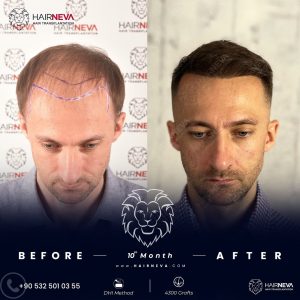A hair transplant clinic in Turkey can offer world-class procedures at affordable prices, making the country a top destination for hair restoration. However, with the rise in demand, there has also been an increase in fraudulent clinics operating without proper credentials. To ensure you receive the highest quality care, it is essential to differentiate between legitimate providers and potential scams. Here’s how you can identify a fake hair transplant clinic in Turkey and avoid falling victim to hair transplant scams.

1. Lack of Proper Licensing and Accreditation
One of the first things to check when researching hair transplant clinics in Turkey is their licensing and accreditation. Reputable clinics are certified by the Turkish Ministry of Health and adhere to international healthcare standards. If a clinic does not display its accreditation or refuses to provide proof of its licensing, consider it a red flag.
What to Look for:
- Certification from the Turkish Ministry of Health
- Membership in international organizations such as ISHRS (International Society of Hair Restoration Surgery)
- Verified reviews on medical tourism platforms
2. Suspiciously Low Prices
While Turkey offers affordable hair transplant procedures compared to many Western countries, prices that seem too good to be true usually indicate substandard services. Scammers lure patients with unrealistically low prices, often compromising on hygiene, surgeon expertise, and the quality of medical tools used.
How to Avoid This Scam:
- Compare prices among the best hair transplant clinics in Turkey
- Be cautious of clinics offering prices significantly lower than the industry average ($2,000–$4,000 for a high-quality procedure)
- Check for hidden costs that may arise later
3. Lack of Qualified Surgeons
A major red flag is when a clinic does not have an experienced and board-certified hair transplant surgeon. Some fake clinics operate with unlicensed or underqualified individuals performing procedures, which can result in severe medical complications and poor results.
How to Verify Surgeon Credentials:
- Look for the surgeon’s educational background and certifications
- Check if they are members of recognized organizations like the ISHRS or Turkish Medical Association
- Request before-and-after photos of previous patients
4. Unrealistic Promises and Guarantees
No legitimate clinic can guarantee 100% hair regrowth or promise instant results. Hair transplant success depends on multiple factors, including the patient’s health, hair type, and post-operative care. If a clinic guarantees overnight success or exaggerated outcomes, it is a clear warning sign.
Warning Signs:
- Claims of “scar-free” hair transplants (every procedure leaves minimal scarring)
- Guaranteed full hair restoration regardless of hair loss stage
- Overpromising density beyond what is medically possible
5. Poor Online Presence and Fake Reviews
Reputable hair transplant clinics in Turkey have well-established websites, active social media profiles, and genuine patient reviews. Fake clinics often have poorly designed websites, lack transparency about their team, and use fabricated testimonials.
How to Spot Fake Reviews:
- Look for detailed patient experiences rather than generic, overly positive comments
- Cross-check reviews on independent platforms like Google Reviews and Trustpilot
- Be cautious of clinics with only 5-star ratings and no negative feedback
6. Unsanitary or Unprofessional Facilities
A clinic’s hygiene and professionalism reflect its credibility. Scammers often operate in unsanitary environments, lack proper medical equipment, and fail to follow standard sterilization protocols. This can lead to severe infections and complications post-surgery.
What to Look for During a Visit:
- A well-maintained, clean, and professional medical facility
- Proper sterilization of equipment and medical tools
- Trained medical staff wearing appropriate protective gear
7. No Post-Operative Care or Follow-Up
A reputable hair transplant clinic provides post-operative care, including follow-up consultations, medication, and guidance on aftercare. Fake clinics often disappear after the procedure, leaving patients with no support.
How to Avoid This Scam:
- Ensure the clinic offers a structured post-surgery care plan
- Ask about available follow-up appointments and communication channels
- Verify if the clinic provides detailed post-transplant instructions
Hair Transplant Clinic in Turkey // Conclusion
Choosing the right hair transplant clinic in Turkey requires thorough research and awareness of potential scams. To avoid hair transplant scams, always verify clinic credentials, compare pricing, check surgeon qualifications, and read genuine patient reviews. The best hair transplant clinics in Turkey prioritize patient safety, use state-of-the-art techniques, and provide comprehensive post-operative care. By keeping these red flags in mind, you can ensure a successful and safe hair restoration experience
